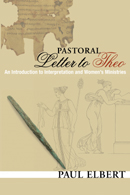Paul Elbert: Pastoral Letter to Theo
 Paul Elbert, Pastoral Letter to Theo: An Introduction to Interpretation and Women’s Ministries (Eugene, OR: Wipf & Stock, 2008), xxiv + 97 pages, ISBN 9781556355462.
Paul Elbert, Pastoral Letter to Theo: An Introduction to Interpretation and Women’s Ministries (Eugene, OR: Wipf & Stock, 2008), xxiv + 97 pages, ISBN 9781556355462.
Is it possible that basic hermeneutical principles are violated in an effort to be politically correct in modern society? Some women have felt betrayed or underutilized in the church due to the interpretation of some NT texts that seem to some to teach that their role is relatively minute in comparison to the role of men. Is it in response to women’s liberation that scholars now contend these verses are mere “cultural statements” and thus no longer apply to today’s society? Can one stay true to a historical-grammatical method of hermeneutics and still prove the validity of women in ministry through the very scriptures that some claim to be stating otherwise? Elbert, employing what he has called a narrative-rhetorical hermeneutical method that is charismatically sensitive and not indebted to the historic presuppositional filter of an “apostolic age,” carefully argues that women do have an equal role of ministry and spiritual gifts in the church. This is the essence of the exegesis set out in Pastoral Letter to Theo: An Introduction to Interpretation and Women’s Ministries.
Elbert opens the book stating the importance of good hermeneutical background and methodology. His intention here is to seek the original meaning and authorial intent on key passages in order to promote a more sustained understanding. He further contends that an interpretive method must respectfully account for the cohesive manner of scripture in its entirety. His purpose, therefore, is to prove that “the Spirit retarding claims, artificially devised epochs, and temporal chasm between original and later New Testament readers as a whole, which have been imposed by Protestant scholarship and formally incorporated within some Evangelical faith traditions since the mid-nineteenth century, are inappropriate and need to be considered for retirement” (xvii).
Elbert goes on to state that one of the major hindrances for an acceptable understanding of key passages is due to poor hermeneutics, particularly in “Bible Belt” zones. He contends that some Evangelical groups, in particular, tend to make “bold and textually untested and unconsidered claims based on proof-texting” (4). While Evangelicals themselves are fine people, some have continued for a long time to dogmatically repeat unreflective claims without giving due consideration to a critical contextual interpretation of the texts they repeatedly tout. The historical result has been to uphold an “apostolic-age” style of interpretation stemming from the male-dominated culture of the Protestant Reformation. In so doing, many of these well-intentioned ministers have focused on what is “doctrinally acceptable and thus keep the tradition of proof-texting alive” (5).
“I did not know Him, but He who sent me to baptize with water said to me, ‘Upon whom you see the Spirit descending, and remaining on Him, this is He who baptizes with the Holy Spirit.’” — John 1:33 (NKJV)
Category: Ministry, Winter 2009


